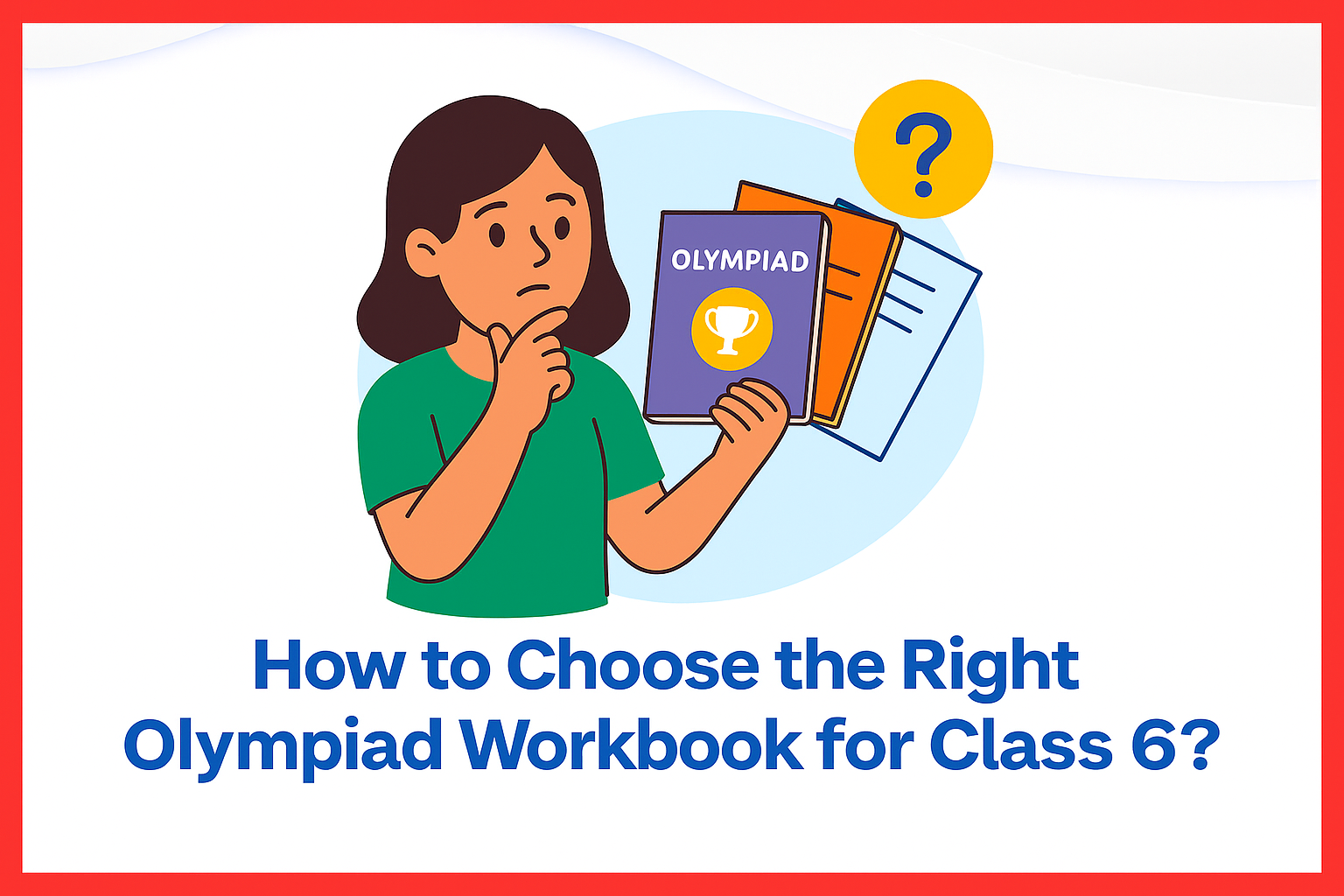The Olympiad exams are one of the most competitive exams of school children. In case of Class 8 students, the exams are not only academic, but also assess reasoning, application based knowledge and problem solving capacity. Olympiad questions are designed to test the conceptual clarity of students whether it is mathematics, science or logical reasoning. To know the pattern of questions many students use an IMO book class 8, a science olympiad book class 8, or a class 8 olympiad book.
In this blog, we will specifically look at what kind of questions are being asked in Olympiad exams at Class 8, their format, subject-wise differences and how students can prepare.
Understanding the Olympiad Question Pattern
Class 8 Olympiad exams are in a multiple-choice format. Students are asked to choose the right answer out of the given options. The questions tend to be application oriented as opposed to memory oriented, meaning that students need to have mastered the concepts in order to answer a question.
For example:
-
Rather than being asked direct formulas, the exam may pose a question in which formulas must be used to solve a real-life problem.
-
Science questions are frequently experimental, case-study or data-interpretation questions as opposed to rote learning.
-
Logical reasoning is the part that involves logical reasoning ability through puzzles, coding-decoding or series based questions.
-
These tests are separated into parts that include Mathematics, Science, Logical Reasoning, and Higher-Order Thinking.
Subject-Wise Breakdown of Olympiad Questions for Class 8
1. Mathematics Olympiad Questions
The Mathematics Olympiad for Class 8 evaluates conceptual clarity in topics like algebra, geometry, data handling, number systems, and probability. Students practicing from an IMO book class 8 often get a clear picture of how questions are framed.
|
Maths Topic |
Type of Question Asked |
Example |
|
Algebra |
Application-based equations |
If (x – 2)(x – 3) = 0, find the value of x. |
|
Geometry |
Diagram-based questions |
A triangle has sides of length 7, 24, and 25 cm. What type of triangle is it? |
|
Mensuration |
Word problems |
Find the surface area of a sphere of radius 7 cm. |
|
Probability & Statistics |
Data interpretation |
A die is rolled once. What is the probability of getting an even number? |
2. Science Olympiad Questions
The Science Olympiad for Class 8 tests both Physics and Chemistry fundamentals along with Biology. These questions are framed to check understanding of principles, experiments, and logical application of scientific knowledge. Many students refer to a science olympiad book class 8 to gain exposure to such questions.
|
Science Area |
Type of Question |
Example |
|
Physics |
Concept & application |
A body is thrown vertically upward. It reaches a maximum height in 5 seconds. Find the total time of flight. |
|
Chemistry |
Reaction-based |
Which gas is released when hydrochloric acid reacts with sodium carbonate? |
|
Biology |
Diagram-based |
Identify the part of the cell that controls all activities. |
|
Environmental Sci |
Real-world problem |
Why does plastic cause soil pollution? |
3. Logical Reasoning Questions
Logical reasoning is an integral part of Olympiad exams. It helps test the analytical and critical thinking ability of students. This section is generally included in all Class 8 Olympiad exams.
|
Logical Reasoning Area |
Type of Question |
Example |
|
Series & Patterns |
Find missing number |
2, 6, 12, 20, ? |
|
Coding-Decoding |
Substitution logic |
If CAT = 3120, then DOG = ? |
|
Blood Relations |
Family connections |
Pointing to a man, Ravi says, “He is my mother’s brother’s son.” How is the man related to Ravi? |
|
Venn Diagrams |
Conceptual sets |
Out of 100 students, 60 like cricket, 40 like football, and 20 like both. How many like only cricket? |
What is the difficulty level of Olympiad questions for Class 8?
The level of difficulty differs according to the subject. Questions in Mathematics and Science are usually moderate to advanced, in terms of conceptual understanding and problem-solving abilities. Logical reasoning is generally moderate but the higher-order thinking questions are tricky.
Do Olympiad questions follow the school syllabus?
Olympiad exams of Class 8 are based mostly on what is taught in school. Nevertheless, the questions are not simple. Rather, they are application-based, and they may involve the students relating two or more concepts. As an example, a science question can be a combination of concepts of heat transfer and real life examples. A class 8 olympiad book would enable the students to recognize such integrated topics.
How many questions are asked in Class 8 Olympiad exams?
The number of questions differ by exam and conducting body. Generally, Mathematics Olympiads contain 50-60 questions, Science Olympiads contain about 50, and reasoning sections contain 15-20 questions. Every question is worth marks which may vary depending on the level of difficulty.
Are Olympiad questions multiple-choice or descriptive?
Olympiad exams at Class 8 are in a multiple-choice format. The students will be required to choose the right answer among the options. There are direct questions and also questions that need step-by-step answers before one can get the correct answer.
Higher-Order Thinking (HOT) Questions in Olympiads
The Higher-Order Thinking Skills (HOTS) is one of the distinctive features of Olympiad exams. These are designed to check the imagination, reasoning and application outside the regular syllabus.
For example:
In Math: A question can be a mixture of algebra and geometry.
In Science: A problem can be one where an experiment is analyzed using data and making predictions.
These questions comprise a major chunk of the Olympiad examination pattern, which means that only students with strong conceptual knowledge will perform well.
Why Are Olympiad Questions Different from Regular Exams?
Regular school exams are usually syllabus-based and test knowledge retention. Olympiad questions, on the other hand, are designed to stretch thinking ability. For instance:
-
Instead of asking “What is Newton’s Second Law of Motion?”, the Olympiad may ask, “If a car of mass 1000 kg accelerates at 2 m/s², calculate the force applied.”
-
Instead of asking “What is the value of π?”, a mathematics Olympiad may ask, “If the diameter of a wheel is 0.7 m, how many revolutions will it make to cover 22 m?”
This approach makes Olympiad exams highly valuable for intellectual growth.
Key Features of Olympiad Questions for Class 8
-
Application-Based – Focuses on understanding rather than memorization.
-
Logical Reasoning Component – A unique section not found in many school exams.
-
Multiple Difficulty Levels – Easy, moderate, and higher-order thinking questions.
-
Syllabus Coverage – Based on NCERT/CBSE/ICSE topics but framed innovatively.
Distribution of Questions
Below is an approximate structure of how questions are distributed in Class 8 Olympiads:
|
Subject |
No. of Questions |
Marks Distribution |
|
Mathematics |
20–25 |
1–3 marks each |
|
Science |
20–25 |
1–3 marks each |
|
Reasoning |
10–15 |
1–2 marks each |
|
HOTS |
5–10 |
Higher weightage |
How Can Students Prepare for Olympiad Questions?
Students need to do more than rote learning to prepare well to take the Class 8 Olympiad exams. It is important to practise problem-solving, case study analysis, and logical reasoning puzzle solving. A class 8 Olympiad book helps many students to be exposed to different levels of questions and patterns.
Revision of topics with examples, practice papers, and analysis of errors will help students reinforce their hold over Olympiad-type questions.
Conclusion
Olympiad exams in Class 8 are meant to challenge how well students can use their knowledge in logical and practical scenarios. The questions are in Mathematics, Science, and Reasoning with a focus on higher-order thinking. Whereas school tests measure memory and simple ideas, Olympiads measure understanding and problem solving.
By understanding the type of questions asked and practicing accordingly, students can not only excel in Olympiads but also strengthen their academic foundation for future competitive exams.










